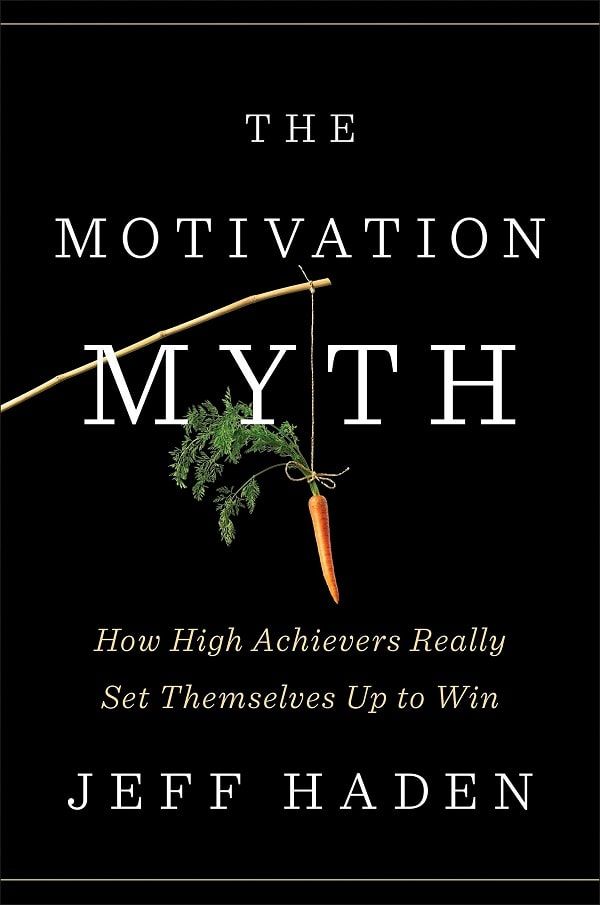
The Motivation Myth, How High Achievers Really Set Themselves Up to Win is a necessary read for athletes, coaches, gym-goers, and anyone else who battles with staying motivated and consistent with their goals.
Written in a conversational, accessible tone, Jeff Haden’s book deconstructs the idea that we need to feel 100% motivated 100% of the time when it comes to our goals. He includes strategies, tips, and research on how high performance actually happens in the real world.
The book provides a general blueprint for how people can make meaningful progress towards their goals while side-stepping a lot of the potholes and mental hang-ups that come with trying to do big things.
If you are an athlete that struggles with being consistently motivated, find your focus wavering under doubt and uncertainty, and you want to gain more pleasure and enjoyment from the daily grind of training, this book is for you.
Below are key quotes and passages from The Motivation Myth. I have also included some of my own thoughts.

Starting is the whole ball game.
The hardest part of working out is getting through the doors of the gym. It’s those few moments of silence before a hard practice. The lead-up to the thing turns out to be the hardest thing of all. Take small steps to get into motion. Once you start moving, it’s easy to keep things rolling.
- “Once you start, it’s easy to keep going. The act of getting out of the house to go for a jog is often harder than actually running the five miles you planned.”
- “Starting is hard because ‘motivation’ doesn’t make it easy to start. Starting provides the motivating to finish.”
Small victories are rocket fuel for results.
It’s tempting to get caught up in the outcome and the results. We daydream about the game winning shot, smashing a PB in the gym, dominating the competition in the closing minutes of a race.
But it’s the little wins along the way that will better sustain your effort and motivation.
The big goal may give you the occasional jolt of motivation, but it can be just as demotivating if you don’t feel like you are making progress fast enough.
- “I’m confident because I have success in my pocket. I’m confident because I’ve done the work.”
- “When you savor the small victories, you get to feel good about yourself every day, because you no longer feel compelled to compare the distance between here and there. You don’t have to wait for “someday” to feel good about yourself; if you do what you planned to do today, you’re a winner.”
Build a process that you believe in and focus on that.
Focusing on the process is essential to achieving big things. Results are driven by a fantastic process, not the other way around.
Instead of shortcuts and hacking, build a daily/weekly process that is honest about the hard work required to accomplish greatness.
- “Process gets a bad rap. Hard work, consistent effort, long hours… That’s what stupid people with no talent do, right?”
- “Hacking is worthless when you need to acquire a complex skill or accomplish a huge goal. Plus, hacking doesn’t provide a jolt of motivation like gaining skill and expertise does.”
Start small with your process and test and evaluate. Keep it simple and work at making it routine and habitual.
- “You’ll stay motivated when you find a process you trust and commit to working that process for as little as a week. Forget how far you need to go to reach your goal; just commit to following the process for a week.”
Be a champion every day.
Athletes don’t become a champion in competition. They have the mindset and routines of a champion long before the gold medal or game-winning drive.
They live the life of the champion every day.
They become elite and championship material in countless moments spread out through practice and their lifestyle—they sleep like a champion, train like a champion, eat like a champion.
- “When you put in the time and effort, when you make improvements, when you gain a certain level of skill, you become the thing that you’re trying to achieve. ‘Becoming’ feels wonderful because you’ve earned it.”
- “And oddly enough, even though “becoming” is incredibly motivating, when you transform yourself into a leader or an entrepreneur or a runner or a musician or whatever you hope to be, you no longer need motivation. You don’t have to find the motivation or willpower; you do what you need to do because that’s who you are.”
Building routines bullet-proof you from needing to feel motivated.
Routines and habits are a powerful way to put your training and goals on auto-pilot. Good habits cut down on the negotiations we have with ourselves when it comes time to do something that will challenge us.
- “When you create a routine, embrace that routine, and see the results of that routine, you stop negotiating with yourself. You see your routine as a task, in the best possible way: Your routine isn’t something you choose to do, it’s just what you do.”
Goals set the stage for your process.
Big goals are important and give us a north star. But having the big goal is only a small part of the deal—the body of your goals is made up of your process. Don’t stop at making a big goal, curate the process necessary to achieve it to keep the dream on solid footing.
- “A dream, once born, quickly dies without a process to support it. Then a dream turns into a regret—and all of us already have too many of those.”
- “The best use of a goal is to inform the process you will follow to achieve it.”
Goals also provide a tricky problem in that they make us feel “less than.” Because we compare our present selves against an idealized future self, the comparison will inevitably draw discouragement.
- “If you’re measuring yourself against your eventual goal… You won’t stack up. You can’t stack up. And you will feel terrible about yourself. Focus on the process, though, and every day that you stick to your routine you will feel good about yourself.”
- “Forget them [your goals]… You will never be able to give yourself positive feedback when you constantly compare yourself with your end goal. You will always be your worst critic because by definition you will never measure up.”
The language you use matters.
Self-talk is an overlooked mental skill for athletes and non-athletes alike. The way we talk to ourselves plays a pivotal role in behavior.
One study took a group of participants and had them set a long-term fitness goal. During the first motivational lapse, participants were split into three groups. They were assigned either I can’t miss my workouts or I don’t miss my workouts, with a control group that were not instructed to use a temptation-avoidance statement.
When it came to sticking to their goals, saying I can’t miss my workout was worse than saying nothing at all, while the I don’t group significantly outperformed everyone. Can’t provides an opening for negotiation, while I don’t is final.
- “I don’t” sounds like a brick wall because it comes from deep inside you. It’s part of your identity. It’s who you are.”

See Also:
My list of the best mental toughness books for athletes (including The Motivation Myth).